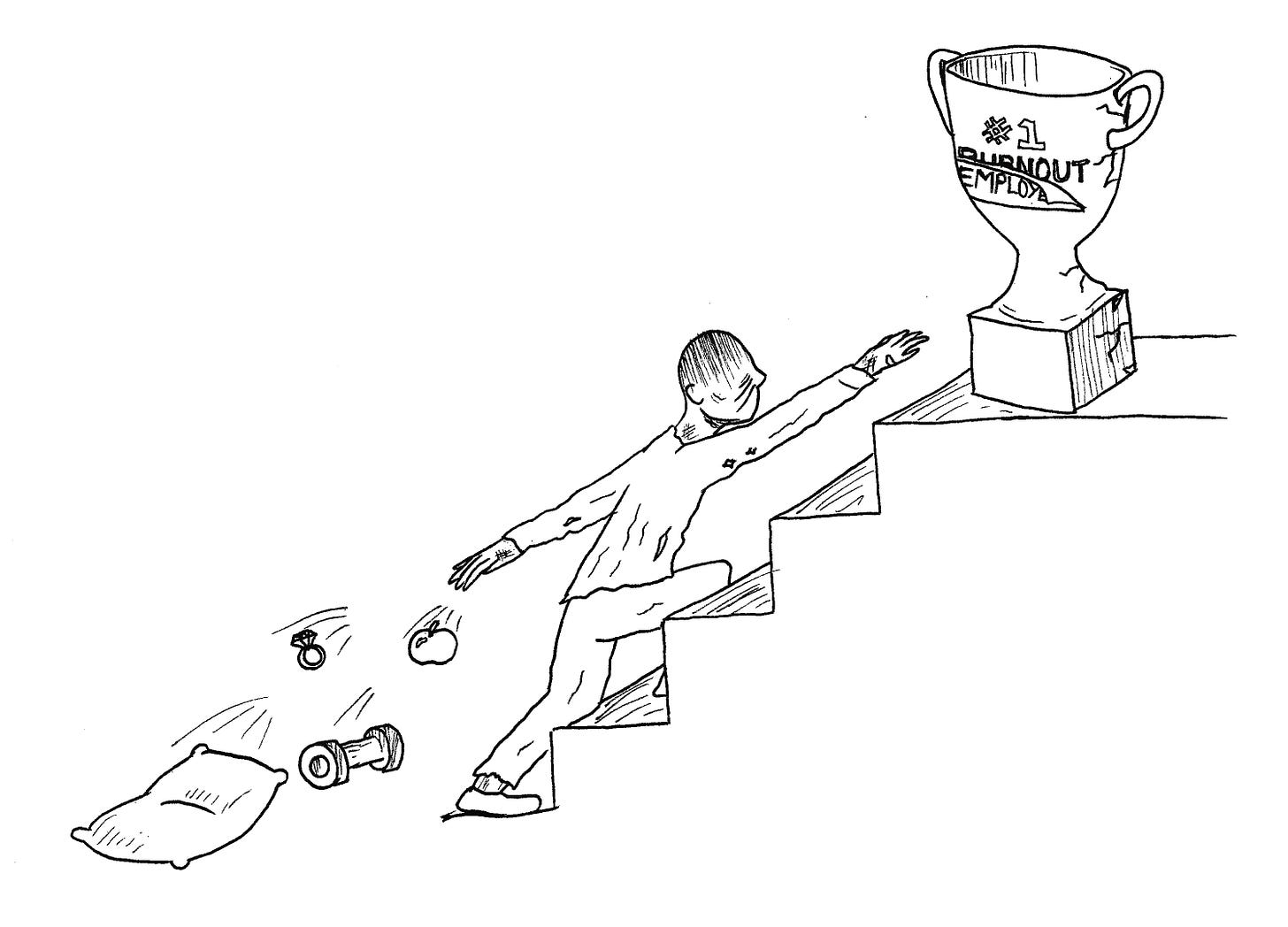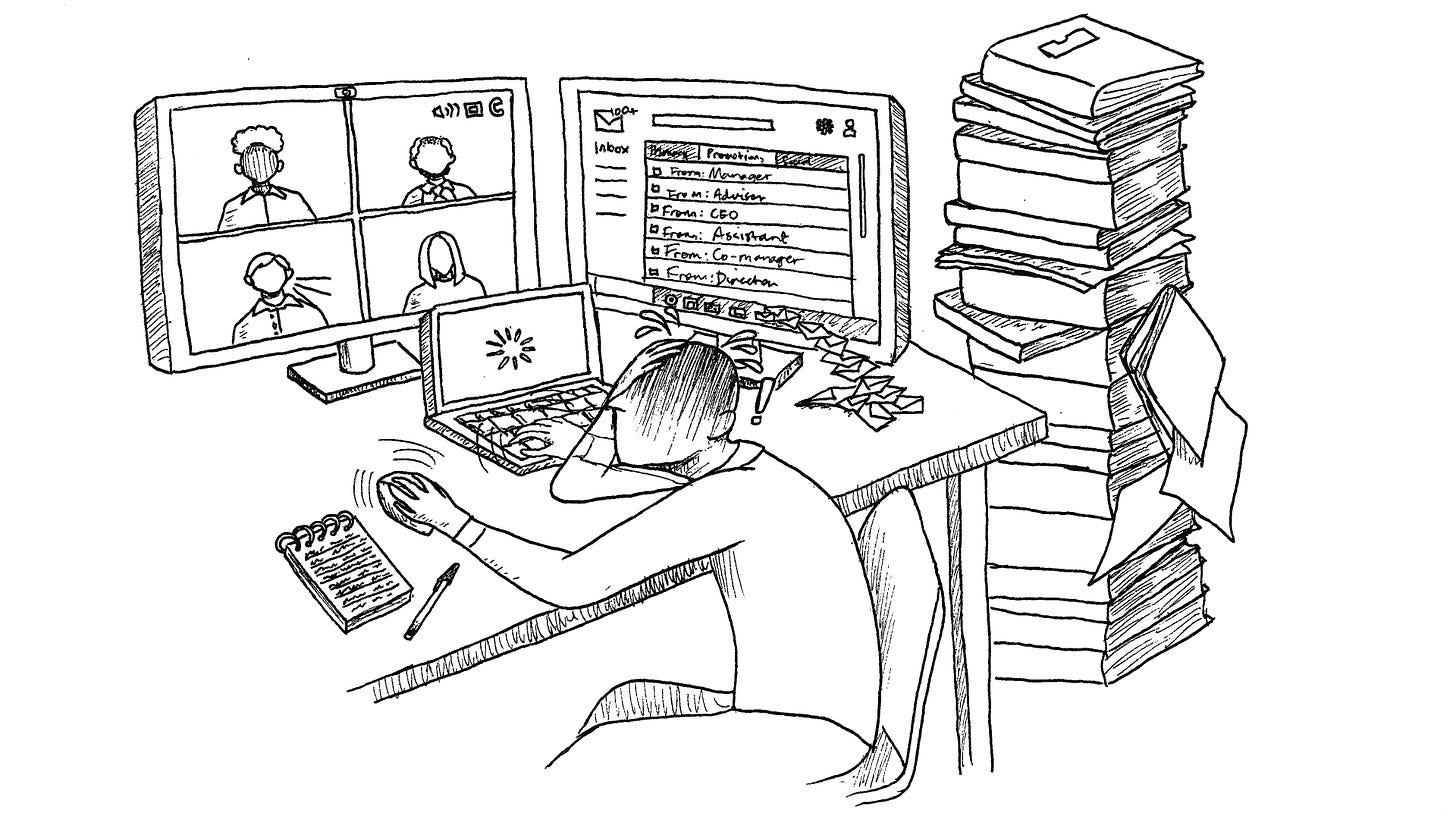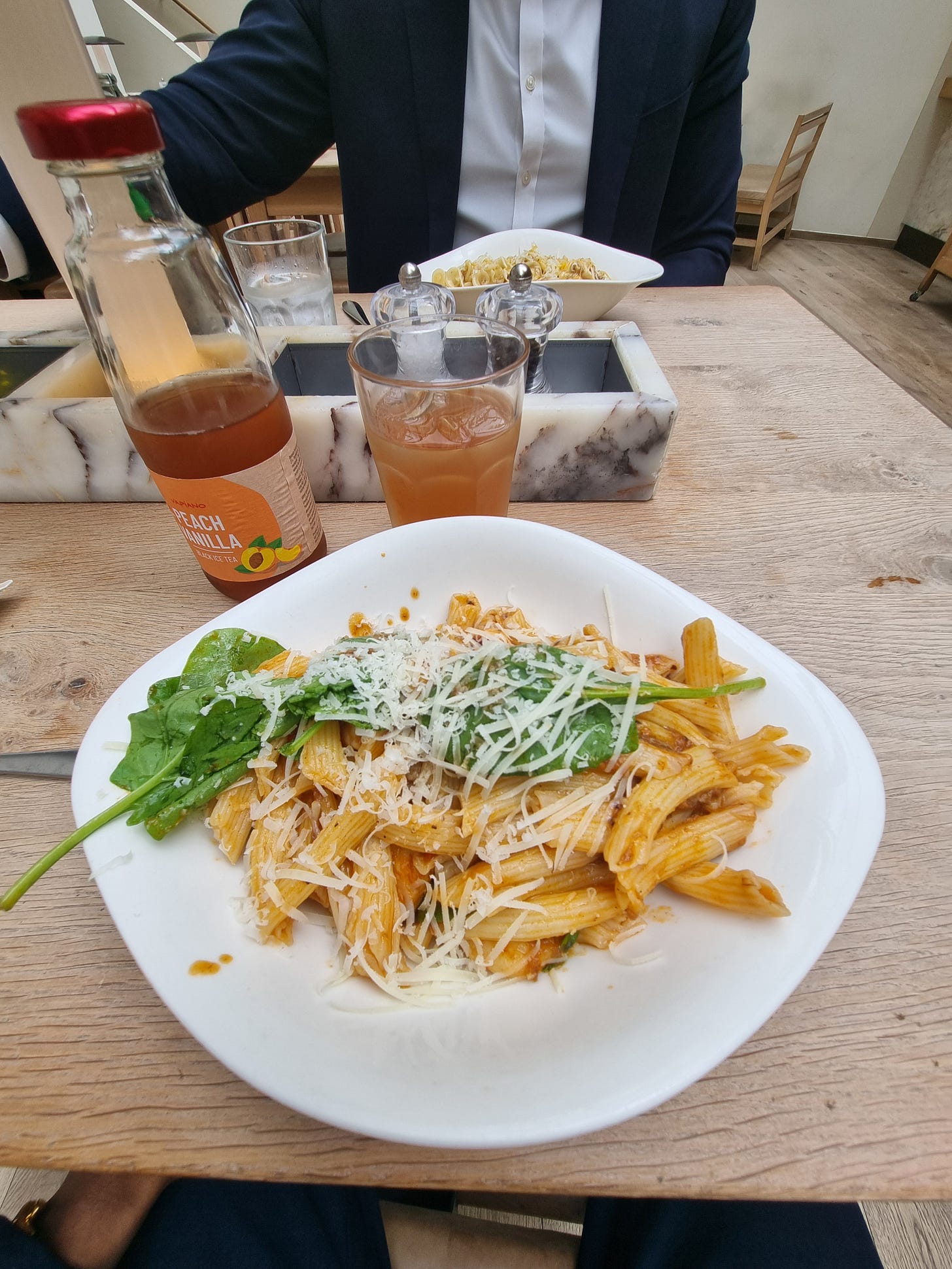This series is based on my experiences and research where I asked my favourite writers about their experiences of stress alongside the lessons they learnt.
Introduction
As a teenager fresh on the corporate scene, the transition from university to work then back to university was not easy. 😅
Around 7 months ago I shared a post on LinkedIn, detailing my reflections on balancing full-time work and writing.
I was posting weekly at the time leading to perfectionism holding me back.
I struggled to keep up and took a break altogether - after posting 14 weeks straight.
But ever since I’ve picked my pen up again, I have ensured to put systems in place in order to continue to exercise my passion for writing, even in the face of uncertainty.
It can get stressful balancing work and writing, but I have and will continue to take on that challenge.
Now when looking into a corporate setting, you have to be dependable and there is always the expectation to perform.
Some days, the sun is luminescent and there’s a cool breeze.
Other days, we get struck by hail and pelted with rain.
We have good and bad days but the expectation doesn’t change.
The landscape of work is changing.
The last 5 years have arguably seen bigger shifts in the job market than in the decades before it.
In my first post on The Thought Base, I brought attention to the Great Resignation where I highlighted the substantial amount of time to reflect as a contributing factor to this trend in the lockdown period.
Interestingly, this aligns with a point I heard from
, a bestselling author, poet, and speaker, who highlighted the urge to find happiness as a driver behind the wellness movement.In the 90s, people settled for the situations they found themselves in and stuck it out, whereas now people acknowledge the fact that they are the makers of their own suffering to a degree.
We kind of see this notion in different areas of our life, and the ways in which we manage stress can be used as a community builder; it meshes common interests together whether its running, reading, or casual networking.
More spaces are being created to take a step back from the stress of working life especially in corporate culture.
In light of this, I spoke to a fellow writer, a working mother in the corporate space whom I’ve learnt so much from.
Sara is powerful.
She presents raw, enlightening, and deeply introspective narratives tied with emotions that radiate through the screen.
I invited her to share her experiences as a mother working in the corporate space.
Q&A
What does work-life balance mean to you and how have you seen it change as a trend throughout your career?
Work-life balance has evolved for me over the years.
Early on, it was about proving myself—saying yes to everything and equating long hours with success.
Now, I see it as work-life integration—prioritizing what matters, setting boundaries, and adapting to life’s changing demands.
The conversation around balance has also shifted. Burnout is no longer a badge of honor, and there’s more focus on flexibility and well-being.
For me, true balance isn’t about splitting time equally—it’s about being fully present in whatever I’m doing, whether at work, with family, or for myself.

How well do you understand your overextended self? Have you developed a sense of your baseline stress and how do you recognise when stress leads to overwhelm?
Understanding my overextended self has been a journey of self-awareness and intentional adjustments.
Over time, I’ve developed a keen sense of my baseline stress—what feels like a healthy level of challenge versus when I’m approaching burnout.
I recognize I’m nearing overwhelm when I start feeling reactive rather than proactive—when simple tasks feel exhausting, my patience runs thin, or I struggle to focus.
Physical signs like fatigue, migraines, or disrupted sleep are also clear indicators that my body is signalling a need to slow down. To manage this, I’ve learned to listen to these cues early.
I take strategic pauses, reassess priorities, and remind myself that rest is productive.
Practices like mindfulness, movement, and structured downtime help me reset before stress takes over completely. It’s a constant balancing act, but one that has made me more intentional about protecting my energy and well-being.
What are some misconceptions of stress that you have dispelled and how has that changed your perspective?
One of the biggest misconceptions about stress that I’ve had to unlearn is the idea that it’s a necessary ingredient for productivity and success.
For a long time, I equated being busy, constantly under pressure, and pushing through exhaustion with high performance. I believed that if I wasn’t stressed, I wasn’t working hard enough.
Over time, I realized that true productivity isn’t about running on empty—it’s about sustainable effort.
High performance comes from self-awareness, strategic breaks, and knowing when to step back before stress turns into burnout. I’ve learned that rest, reflection, and intentional pacing actually make me more effective in the long run.
Another misconception I’ve let go of is the idea that stress is always negative.
While chronic stress is harmful, short bursts of stress can serve as a motivator—pushing me to rise to challenges and adapt.
The key is learning how to differentiate between productive pressure and destructive overwhelm.
Shifting my perspective on stress has allowed me to work smarter, not harder. Now, I focus on maintaining balance, listening to my body, and prioritizing well-being alongside ambition.
Success isn’t just about how much you can handle—it’s about how well you manage what comes your way.

How do you communicate stress in a corporate environment?
Communicating stress in a corporate environment requires emotional intelligence. It’s important to express concerns proactively, frame challenges with solutions, and leverage support systems like mentors, managers, or peers.
One of the biggest lessons I’ve learned about work is the importance of prioritizing my well-being. Experiencing serious health challenges—some of which stemmed from overworking—completely shifted my perspective. After facing near-death experiences, especially during pregnancy, I realized that no job or ambition is worth sacrificing my health.
Now, I’m intentional about managing stress and maintaining balance. Nutrition plays a huge role in my overall well-being, and I stay active through workouts or, when that’s not possible, simple walks. Meditation helps me stay grounded, and I love playing puzzle games to keep my mind sharp and focused. Taking care of myself isn’t just a luxury—it’s a necessity for showing up fully in both my personal and professional life.
As a first child, do you think there is a link between that and stress? Has that affected the way you brought up your children and how do think this dynamic may have helped in your career?
Being the first child often means stepping into a leadership role early in life—whether you realize it or not. There’s an unspoken expectation to set the standard, be responsible, and sometimes even act as a second parent.
This ingrained sense of duty has shaped how I navigate stress, relationships, and leadership both at home and in my career. In many ways, this dynamic has made me resilient and adaptable.
I’ve learned to problem-solve quickly, anticipate challenges, and take ownership of situations without waiting for direction.
It has also made me deeply empathetic, as I naturally assume the role of a mentor and supporter, both in personal and professional spaces.
When it comes to parenting, I’ve become more aware of how these early experiences shaped me, and I make a conscious effort to ensure my children feel supported rather than pressured.
I want them to embrace responsibility in a way that feels empowering rather than burdensome.
In my career, this background has helped me develop strong leadership skills—particularly in guiding teams, making tough decisions, and managing high-pressure situations with a level-headed approach.
However, I’ve also had to unlearn the habit of carrying everything on my own. Delegation, collaboration, and seeking support are lessons I’ve had to intentionally cultivate over time.
So yes, being the eldest child has had a profound impact on how I handle stress, raise my children, and lead in my career. It’s a dynamic that has shaped me, but one I’ve also learned to balance in a healthier way over time.
Reflections
One thing about Sara’s writing that I really appreciate is the conciseness through which she conveys her message.
For me, it’s impossible not to relate to her.
To follow on from my observations on the wellness movement inspired by Yung Pueblo, my first question centred around work-life balance.
I’ve entered the workforce at a good time I think.
Since March 2020 which was the first nationwide lockdown in the UK, corporate culture has shifted in ways that nobody could have foreseen.
From having to work from home, to staggered returns accompanied by hybrid working, then a large number of companies reinstating the need for everyone to be in the office which got pushback from employees.
Now, there is a clear expectation to work from home at least once a week.
That newfound freedom and flexibility is one that employees are still trying to find the balance of, and to mirror what Sara said, burnout is no longer a badge of honour.
Instead it reminds me of my post ‘What does success look like?’ as seeking to push the limits to the point of burnout is a form of validation; a way to prove yourself to others that you are a hard-worker.
In that post, I say:
“Where visible success prevails, some fall into the illusion that success is not only an end goal, but also fits a mostly fixed criteria, almost like a checklist.”
You don’t have to be burnt out to prove your work ethic and it is certainly not a badge of honour.
There are symptoms and signs that your body give you that shouldn’t be ignored.
In the case of Sara, the persistence to subscribe to the requirement of intense pressure and stress led to serious health problems, which highlighted that health shouldn’t be sacrificed for ambition.
From the corporate experience I have had so far, having something to do outside of work is championed, intriguing, and is what people attest to your personality.
It’s about having a balance.
Working 12+ hours is something I’ve heard of through asking questions, not it being bragged about.
The lessons cultivated by years of experience highlights the pitfalls for which the narrative is shifting, as well as reaffirms the importance of self-awareness.
“Over time, I realized that true productivity isn’t about running on empty—it’s about sustainable effort.”
This point stood out to me as it draws parallels with the narrative that as an ethnic minority person, we have to work twice as hard.
We grow up immersed in the narrative of hard work, but never hear the word strategy.
Without strategy, there will be no sustainable growth and this idea of overworking ourselves is not made any easier by being a first child.
From my research post on stress, I was surprised by the lack of studies looking into the relation between stress and resilience, and it seemed conventional wisdom that any adversity or challenges from a young age will lead to us being mentally resilient, called the ‘steeling effect’.
Just as an older sibling, we acknowledge the need to put on a strong face, to be a positive role model, and delineate a clear path for ourselves.
Like Sara describes, we therefore put the weight on our shoulders which has a strong influence on how we view our purpose and sense of duty, mirrored in our attitudes within a corporate setting.
Unlearning the feeling of having to do it alone is a journey I’m on myself, as I acknowledge the importance of collaboration especially when there is a shared drive towards a certain goal.
It is clear to see that stress as a metric for success leads to toxic results.
Can you differentiate between “productive pressure and destructive overwhelm”?
P.S.
What is your experience of stress in a corporate environment? Have their been misconceptions you’ve had to unlearn?







It's interesting to hear other's experiences of stress, I was particularly interested in "not all stress is bad", framing some stress as a motivator and I think that is very true, especially at work, because once you have dealt with the stressor, you can tick it off the list and the stress is gone, often accompanied with a sweet hit of dopamine. Like a neurochemical cocktail, a pint of cortisol with a dopamine chaser.